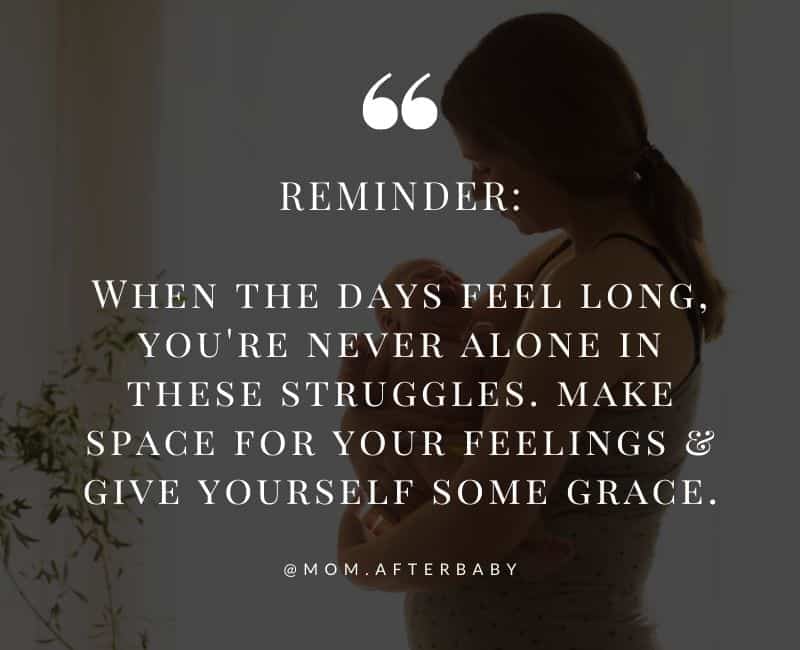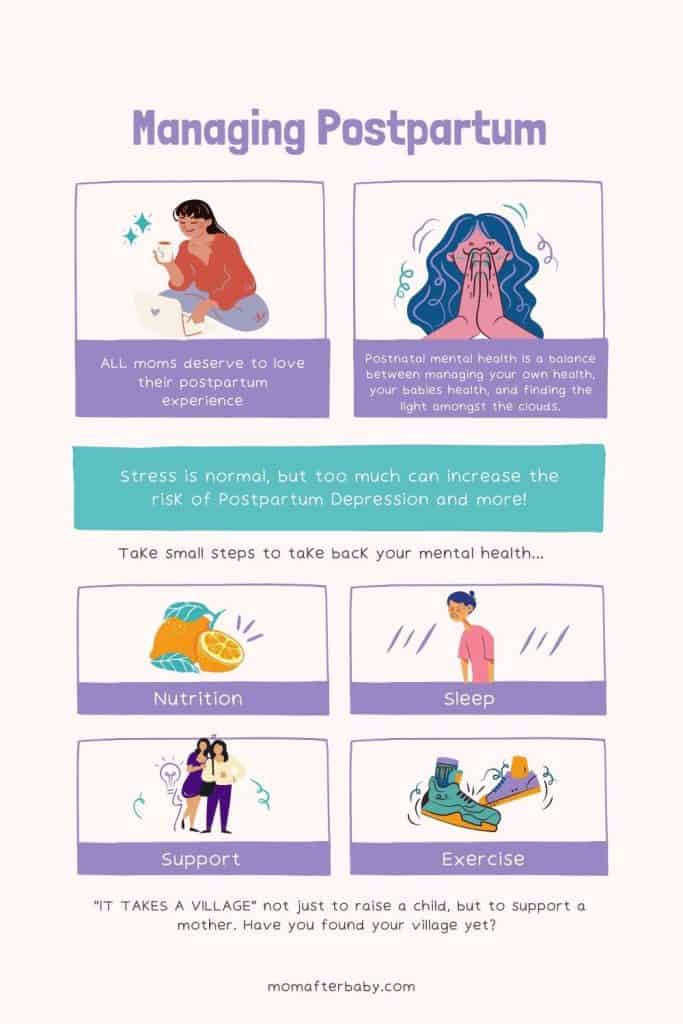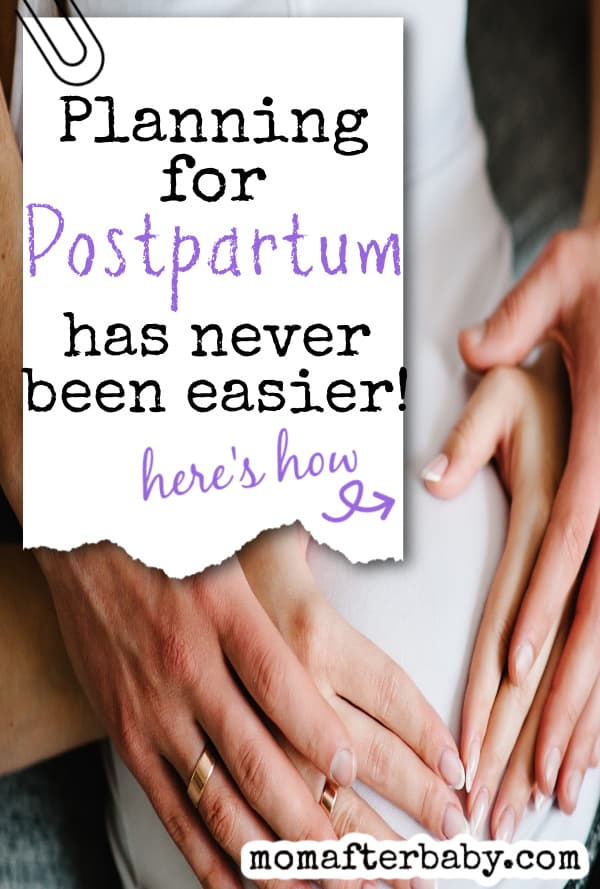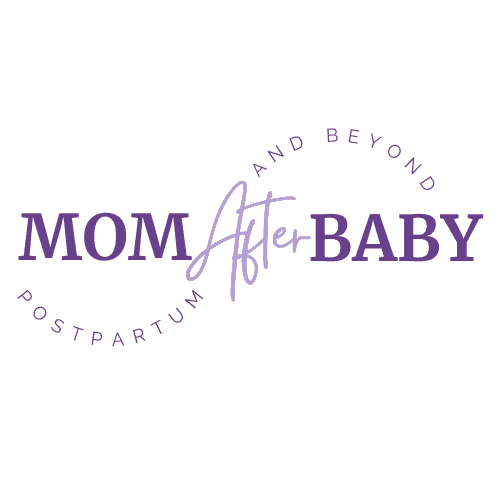Planning For Postpartum Has Never Been Easier, Here’s How!
This post may contain affiliate links that I may receive a commission from if you click & buy. In addition, the information on this site is NOT intended to be medical advice. See my full policy for more information.
As a mom who completely overlooked the warning signs of my crippling postpartum mental health that started halfway through my first pregnancy, I’m here to help you start planning for postpartum even if you’re still pregnant.
What so many expecting women don’t realize, is that their mental health can be greatly affected before the postpartum period.
Postpartum is referred to as the time period after birth until about 6 to 8 weeks after, but we all know postpartum is really an ongoing stage.
It’s often talked about like it’s a dark cloud, but it’s often overlooked that that dark cloud could’ve been following you around throughout your entire pregnancy.
You see, both seasons of motherhood (pregnancy and postpartum) come packed with challenges. Some ending in sweet bliss, with others ending in sadness, anger, and sometimes, even depression.
Understanding how your mental and emotional health can be impacted by pregnancy and postpartum is crucial for a mom to be.
The good news is that there are many ways you can set yourself up for a positive experience and have the help you need in the palm of your hands if and when needed before your new baby arrives — that’s what you’ll learn today!

Steps to planning for postpartum
I know you’re thinking, how can I plan for something that hasn’t even happened? Simple, you gather the resources and information you need so that you’re not running around searching for it in the heat of the moment. Here’s what I mean:
1. Make a postpartum plan
Everyone will ask mom if she made her birth plan left and right. Is mom wanting natural labor? Will mom get an epidural? I mean trust me, some people are genuinely interested, but others are just plain nosey.
What this question doesn’t do, is it doesn’t address the fact that mom should ALSO be focusing on planning for her postpartum experience via a postpartum plan.
Honestly, most moms I know have told me they didn’t even have one. They just “winged it”.
So, here are some things to think about when making your postpartum plan:
- How will you and your partner divvy up your time (who will be in charge of what tasks — with baby and/or around the house)?
- Who will be responsible for cooking or getting food while you recover?
- Will anyone be free to give you a hand with your baby (who/what’s your relationship with them — family members, friends, or caretakers)?
- Do you have all the supplies at home needed to help recover from birth?
- Are you familiar with who to call for help if you feel like you’re becoming down and depressed (beyond the baby blues)?
- Do you have resources available to help you work through common postpartum challenges (such as the PPD Workbook or the Visible Motherhood Workbook)
2. Have a support circle or system in place
As a mom who keeps her circle of friends pretty small, let me tell you, I’ve never longed for more mom friends after becoming a mother myself.
There’s just something about connecting with other moms who just get it. And trust me, it’ll come in extremely helpful during those early weeks.
However, if you’re still in the early stages of building those motherhood friendships, making sure you have your partner, family, and current friends in your circle is key.
Don’t let everyone in though. Make sure to select those you can completely trust and confide in should the time arise (and it very well will happen).
A support circle doesn’t have to JUST consist of friends, here are some people you might find in your support network:
- Your health care provider
- Lactation consultant
- Postpartum doula
- Family members
- Friends
- Postpartum support group (I have a free new mother facebook group you can join here for free)
According to the American College of Obstetricians and Gynecologists, “having a strong supportive network is one of the keys to success during postpartum“. Let’s face it. New mothers are exhausted in the fourth trimester. This key time of transition will leave them feeling like they just can’t get a break and between all the physical healing, emotional processing, and mental health changes — they likely can’t. Don’t spend the little time you have left waiting to set up your support group, get started now.
3. Discuss any concerns ahead of time with your partner
Most new parents are no strangers to relationship problems after their baby arrives. This isn’t due to ill intent, it’s just parenthood is a huge adjustment for both mom and her partner. It’s no shocker some birth centers and hospitals offer postpartum family planning classes to try and bring these common challenges to light and help parents prepare for the journey ahead, but that’s not the only way to prepare.
Some of the ways you can start working now to try and prevent some of these obstacles are to:
- Make sure you’re on the same page with one another (who will handle finances? who will handle household chores? if mom is breastfeeding, can partner take over making meals? — things like that)
- Don’t neglect your relationship. I know it seems obvious, but the relationship between parents is often the first thing to get set on the back burner. Taking time to hold hands around the house, stop for a 6-second kiss or even watch a movie together can be small bonding activities that hold your relationship together throughout this new change.
- If your relationship has already had some significant challenges, Id encourage you to seek out couples therapy or to check out Dr. Tracy D’s Be Connected monthly relationship-building subscription. Her subscription is so amazing (I know because I’m a subscriber) and has helped me connect with my husband 100x better now as parents than ever before!

4. Know who you can contact if help is needed
Did you know there are legitimate resources available for mothers should they need more support than just a friend or family member? Postpartum isn’t just about raising a new baby, it’s about a mother’s health, wellness, and maternal mental health. According to La Leche League (one of the world’s leading organizations for breastfeeding and maternal health resources & information), “around 85% of women will experience some kind of mood disturbance postpartum“.
Why might postpartum women need “help”? Well, there are a few reasons new moms could be needing help that extends beyond what family and friends can offer.
- Postpartum Depression: Feelings of sadness, anxiety, despair, and sometimes anger that have an onset up to 2 years after birth, but most commonly occurs a few weeks after birth.
- Postnatal Care Complications: These could be associated with not healing appropriately from a cesarean, having pelvic floor or episiotomy complications after birth, and much more.
- Experiencing Preterm Birth: Preterm births usually end up with lots of time spent in the hospital (neonatal intensive care unit) which can be isolating and lonely for parents as they navigate living out of a hospital and a new side to parenting that involves preterm infant care.
Now that you know some of the reasons new moms may need additional support during those first weeks after bringing their baby home, here’s a few resources to make note of (especially if you’re preparing for postpartum right now):
- PSI (Postpartum Support International) Helpline: 1-800-944-4773 (4PPD) You can leave a confidential message at any time and a trained volunteer will return your call quickly.
- National Suicide Prevention Hotline: 1-800-273-8255
- SAMHSA National Helpline (24/7, 365 days/year): 1-800-662-HELP (4357).
- Postpartum Progress (an informative website that provides support and in-depth information for postpartum moms.
5. Be prepared to give yourself some grace
Your body and life will be going through such an impactful change. You have a new family that you’re learning to love, raise, and accept. You are going to experience a lack of sleep you’ve never thought was possible before and then be expected to just carry on. And you know what? You don’t need to This special time is one to take slow and steady. Don’t beat yourself up if you aren’t your “old self” right away. Sometimes, you may not find her for some time and that’s ok.
Take the time to show yourself patience, love, and understanding as you recover and journey through this wild ride known as motherhood.
6. Set Up a Meal Train
A meal train is an organized delivery of meals (cooked or purchased) to families in need. More often, the family receiving the meals aren’t the ones organizing this event, however, you can definitely request friends and family to help put one together for you.
I remember one of the most stressful parts after my first was born, was trying to figure out what we should eat, what to get from the grocery store for dinner, etc…
As a new parent, you will spend a lot of time learning, adjusting, and surviving. The last thing you should be stressing out about is what’s on the menu for breakfast, lunch, or dinner.
7. Consider Hiring a Postpartum Doula
A postpartum doula is someone who provides support, resources, and comfort to new parents after birth.
They do things like:
- Provides evidence-based information to new parents
- Emotional support and listening to new moms, parents, and their family’s needs
- New baby care and support
- Home life support (doing some of baby’s laundry, cooking some meals, etc…)
- Overnight in home support and more!
The downside, I don’t know any doula support that is covered by insurance. You must pay out of pocket for them.
Yes, it can be quite an investment. From virtual support to in-home support — you could be looking at $400+ just for a couple of weeks.
The postpartum stage requires a lot of care, especially for mom and the new baby. This is why it can be a good time to have the extra support that a postpartum doula can offer — it truly is invaluable.
Planning for Postpartum: Final Thoughts
You don’t need to spend a tremendous amount of time trying to come up with your written postpartum plan. It will never be perfect.
However, you can get familiar with experts who can help, make certain tasks easier (like meal prepping while you’re still pregnant), stock up on the supplies needed for postpartum healing, etc…
Perfection is never the goal. However, preparation can make a huge difference in a mom who feels isolated without any social support or help vs a mom who isn’t overwhelmed with things to do and has a village in her corner.
You see, preparing for postpartum time isn’t just about how you’re going to raise your baby. It’s exposing yourself to the common challenges that aren’t talked about enough, such as basic postpartum care, depression & anxiety disorders, caring for a newborn baby, or raising a second child with a toddler at home. There’s no linear path during the fourth trimester, but hopefully, these tips above can help you prepare so you can enjoy your postpartum experience and maintain a happy family.
Looking for more Postpartum support and tips? Look below





